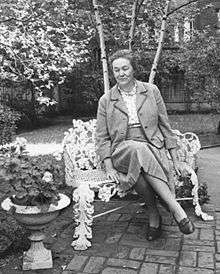Alice Recknagel Ireys
| Alice Recknagel Ireys | |
|---|---|
 | |
| Born |
Alice Elizabeth Recknagel April 24, 1911 Brooklyn, New York |
| Died |
December 12, 2000 (aged 89) Brooklyn, New York |
| Nationality | American |
| Alma mater | Cambridge School of Architecture and Landscape Architecture |
| Spouse(s) | Henry Tillinghast Ireys III |
Alice Recknagel Ireys (1911–2000) was an American landscape architect whose notable clients included the Brooklyn Botanic Garden, the New York Botanical Garden, the Clark Botanic Garden, the Abigail Adams Smith Museum, and the Brooklyn Museum.[1][2]
Early life and education
Alice Elizabeth Recknagel was born on April 24, 1911, in Brooklyn, New York, to Harold S. and Rea Estes Recknagel.[2] Her father was an insurance-industry attorney.[3] The townhouse Alice grew up in had been occupied by her family since the 1830s, and she would live there her entire life.[1]
Alice became interested in gardening as a child by working with her grandfather at a family farm in Green Harbor, Massachusetts.[3] Her interest developed further as a result of a program at the Brooklyn Botanic Garden funded by the Burpee seed company that allowed children to grow plants and then take them home.[1] She went to school at the Packer Collegiate Institute in Brooklyn and then on to the Cambridge School of Architecture and Landscape Architecture, which was then affiliated with Smith College. Although the Cambridge School ordinarily only admitted women holding a B.A. degree, Recknagel persuaded school founder Henry Atherton Frost that her Packer diploma was the equivalent of a junior college degree and so secured admission.[3] She took four years to complete the three-year program, graduating in 1935.[1]
Personal life
Alice married Henry Tillinghast Ireys III in 1943. They had three children, Catherine, Anne, and Henry, and for a period after their births Alice cut back on her landscaping work.[3] Henry died in 1963.
Career
Ireys initially worked around New York in collaboration with other landscape architects, including serving as an assistant to Marjorie Sewell Cautley. These commissions ranged from public housing projects to lakeside plantings for the 1939 New York World's Fair.[1] She set up her own office in 1947 out of her Brooklyn townhouse.
Ireys became known for a design aesthetic that bridged between the late 19th century ideal of the gracious formal estate and the 20th century concern for modest residential landscaping and enhanced public spaces. She borrowed elements such as terraces and parterres from large-scale landscaping and modified them for more limited acreage, emphasizing such features as serpentine walkways that created an illusion of larger space than actually existed.[1] Over the course of a long career, she designed over a thousand projects in more than a dozen states.
For the Brooklyn Botanic Garden, she designed both the Mae L. Wien Cutting Garden and Helen's Garden of Fragrant Plants (now the Alice Recknagel Ireys Fragrance Garden). The latter was designed specifically for the vision-impaired as a memorial to a blind woman named Helen Goodhart Altschul. It featured wheelchair-accessible paths, raised beds, and Braille signage, and visitors were encouraged to touch the plants. It was widely imitated by designers concerned with making public gardens accessible to people with disabilities.[1]
In the mid 1960s, following her husband's death, Ireys began writing books, aiming them at amateur gardeners rather than professional landscapers like herself.[3]
In the 1980s, she began working with Burpee, designing specialized gardens which Burpee customers could purchase as a package that included the plans plus all needed seeds and plant materials.[2]
In 1978, Ireys was elected a fellow of the American Society of Landscape Architects. In 1991, the American Horticultural Society gave her its highest honor, the Liberty Hyde Bailey Award. She received other awards from the Garden Writers' Association of America and the Brooklyn Botanic Garden.
Ireys worked up to her final illness, dying in Brooklyn on Dec. 12, 2000. Documents and photographs relating to her professional life are held by Smith College. A documentary film about Ireys, The Living Landscapes of Alice Recknagel Ireys, was released in 2000.
Selected publications
- Designs for American Gardens (1991)
- Garden Designs, (1991)
- Small Gardens for City and Country (1978)
- How to Plan and Plant Your Own Property (1967)
References
- 1 2 3 4 5 6 7 Deitz, Paula. "Alice Ireys, 89, Dies; Designed Elegant Landscapes Bridging Traditions". New York Times, Dec. 17, 2000.
- 1 2 3 "Alice Recknagel Ireys Papers, 1885-2001". Five Colleges Archives & Manuscript Collections website.
- 1 2 3 4 5 Zaitzevsky, Cynthia. Long Island Landscapes and the Women who Designed Them. WW Norton & Company, 2009.